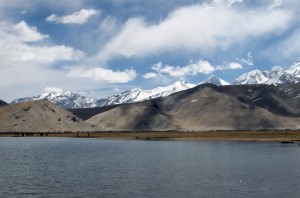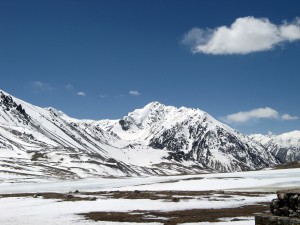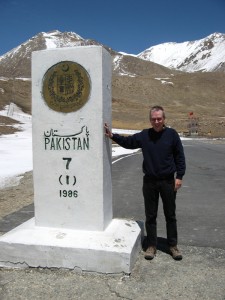Kashgar, April 30th 2008
The only road between China and Pakistan is the Karakoram Highway (KKH) which goes over the 4730 m (15,500 ft) Khunjerab pass at the border. It is a spectacular journey, over a wild road, across the Western edges of the Himalayas.
The pass is closed in winter and nominally reopens on May 1st each year. I was duly in Kashgar on April 30th, hoping to catch either a jeep or the two-day cross-border bus via Tashkurgan (China) to Sost (Pakistan) the following morning. But at the Chini Bagh Hotel, I learned from the redoubtable Ali Tash of UighurTour that there were problems crossing to Pakistan. First, the bus company was unclear about whether they would start the bus service tomorrow or not. It is the multi-day Chinese May 1st holiday and there was a natural lack of enthusiasm for starting the bus service on the holiday. Sigh. Second, the Chinese authorities have changed the regulations so that any independent jeep drivers going across the border now need a passport, not simply their Chinese ID and right now there aren’t any drivers available who have all the needed paperwork.
Kashgar to Tashkurgan, May 1st 2008
Early next morning I check at the bus station and learn there “probably” won’t be a bus through to Pakistan until May 5th. Sigh. Back at the Chini Bagh, I arrange a car for the initial hop to Tashkurgan, via one of Ali Tash’s capable henchmen.
We made a fast (under five hour) trip down to Tashkurgan. The road was through spiky mountains, with some snow caps. We made a brief stop at lake Kara Kul. It’s pleasant and scenic, but there is much better scenery elsewhere on the KKH.
At Tashkurgan I checked into the spartan but adequate Jiao Tong (“Transport”) Hotel, which is convenient for buses and customs. After several strolls through town, I confirmed that the local jeep drivers don’t have passports and thus can’t go into Pakistan and that no jeeps had come in from Pakistan. Sigh.
Tashkurgan, May 2nd 2008
“The Border is Open, but you cannot cross.”
Tashkurgan is at 10,000+ ft and is pleasantly cold after Kashgar’s heat, with clear clean mountain air. There are a number of hotels in town catering to Chinese tourists, who come out here to China’s far West to enjoy the scenic views of the Western Himalayas.
At reception, I learned that a bus had come over from Sost the night before and the reception clerk assured me that this meant the bus would go back to Pakistan today and I could catch it “at immigration”.
After a great deal of confused searching, I finally located the “bus station”, actually a ticket counter cunningly hidden in the middle of the custom and immigrations area. But after hanging out for over an hour, I am officially informed that (a) the border is open and (b) there will be no bus to Sost today. However, I am assured there will be a bus tomorrow. Hmm. We’ll see.
Tashkurgan to Sost, May 3rd 2008
By the following morning several other travelers have straggled in, and seven of us show up at the bus station desk at immigration on May 3rd. Apparently we now have a quorum, and they duly arrange two vehicles for us, a land cruiser and a small minibus.
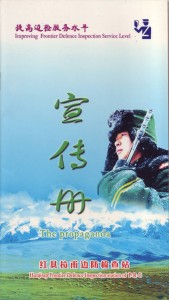 A little later a squad of a dozen or so smartly uniformed Chinese frontier police march up in neat formation and then disperse to chat and slowly boot up the immigration PCs.
A little later a squad of a dozen or so smartly uniformed Chinese frontier police march up in neat formation and then disperse to chat and slowly boot up the immigration PCs.
The frontier police appear to have recently conducted some kind of team self-improvement project on how to improve customer service and they provide a helpful leaflet, in Chinese, Uighur and English, charmingly labeled “The propaganda“.
The leaflet notes their goals and their key self-improvement resolutions. These include basics such as “Don’t play, chat or smoke” , the encouraging “Don’t treat passangar coldly, strongly and arrogantly“, the sterner “Don’t ask and accept money“, the slightly worrying “Don’t scold, beat and punish the suspicious criminals” and ends with the wise “Don’t revenge the people who have complained.” I am very happy to learn of all these fine resolutions.
After the PCs booted, we were carefully and politely processed through.
I took the minibus with an Irish couple. Two Chinese frontier police joined us, carrying supplies for their colleagues nearer the pass. Alas, our little minibus proved prone to overheating. We made several stops so the driver could pour icy stream water into the overheated engine. At one point the engine actually died and we had to push it a short way until it could roll downhill to the nearest stream and get some cold water.
As we drove, I was delighted to see a golden marmot run across the road in front of us. He was big and plump and very golden. Later we saw many others off in the distance.
We stopped briefly at various checkpoints along the way, both Chinese and Pakistani.
The actual border point is at the top of the Khunjerab Pass (4730 meters) with suitable markers. Like everyone else, we stopped for photos, the clock change, and the change to the left of the road.
The road on the Chinese side of the border was easy and well maintained, but it immediately became much rougher on the Pakistani side. There were often steep drops on the side of the road. But the mountains are also steeper and more scenic. We passed many frozen rivers and one major glacier near Passau.
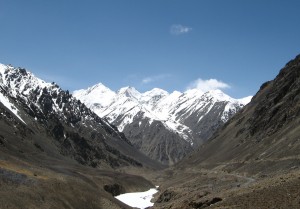 In the Khunjerab National Park we saw World Wildlife Fund signs. We saw a small group of ibex fording a small river. We dutifully paid our 35 Yuan park entry fee at the park exit.
In the Khunjerab National Park we saw World Wildlife Fund signs. We saw a small group of ibex fording a small river. We dutifully paid our 35 Yuan park entry fee at the park exit.
We saw no freight traffic and only a few jeeps going the other way. However at the Pakistani border post there is a notice recording that about 5700 Pakistanis and 8500 foreigners came south in 2006, with similar outgoings. That’s still fairly light traffic for a major cross-border route.
At Pakistani immigration at Sost we confirm that we were the first foreigners to come south through the pass this year. Ha!
After some haggling over who went where in what, I shared a taxi with an English couple to Karimabad. Our driver turned out to be an Ismaili who among other things was learning Japanese. He explained vigorously how he was very proud to be Ismaili, because they didn’t hurt anyone! We applauded this fine sentiment!
